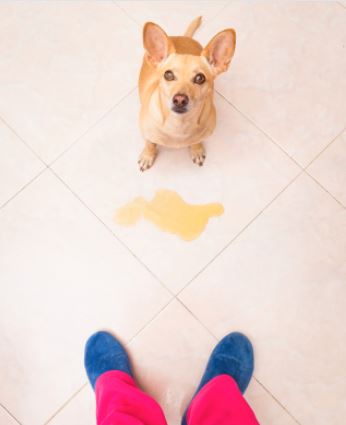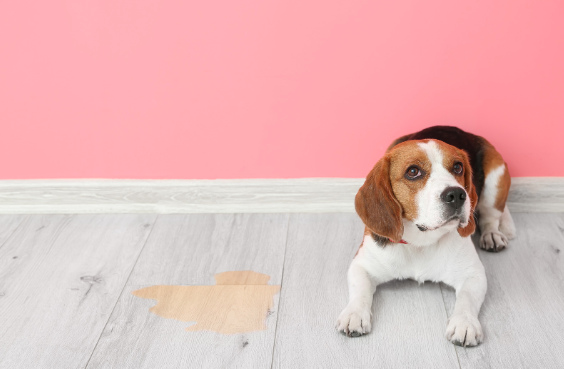Solution of Why Does My Dog Pee When He Sees Me: If you are reading these lines, your dog pees when you get home. This condition, which usually occurs in puppies, happens because they are so happy to see you that, for a moment, they lose control of their sphincters and end up having a bowel movement.
Why Does My Dog Pee When He Sees Me?
If this is your case, you do not have to worry. Your pup is going through a normal stage of his development, and he’s going to outgrow it without you doing anything.

Consider that puppies control their sphincters until they are 4-6 months old, so these types of accidents are temporary. We recommend you limit their access to your bed, room and other “sensitive” places inside the house. As he grows and you train him, you will notice that he is ready to make good decisions.
If your puppy is 3 months or older, it’s a good time to start potty training in one place.
5 Important Solutions to Avoid Emotional Evacuation in Adult Dogs
Suppose your dog is no longer a puppy and continues to urinate when you get home. In that case, we recommend changing some habits when you arrive home so that your dog associates your arrival with a pleasant moment that he will only get when he is calm and relaxed. Although it may be difficult to achieve at first, as the days go by, you will get used to doing them and notice their effect on your pet.
1. When you get home, enter very calmly without paying attention to your dog. Please don’t talk to him, don’t touch him, and don’t show him any affection until he has calmed down.
2. When your dog is calmer, call him and then gently pet him. He is the dog that should approach you. Don’t go after him.
3. If your dog is very nervous, you can take him to your patio, garden and before petting him, make him follow any of the five basic commands that every dog should know: “SIT,” “STILL,” “COME HERE,” “LET GO,” and “LIE DOWN.” This will keep him focused on the exercise and lessen his excitement. Remember, a trained dog is a calm dog.
4. The more nervous your dog is, the calmer you should be. There are dogs that calm down very quickly, and others have a harder time, but if you show calm, your dog will follow your example.
5. If your dog gets too excited to leave the house, do your usual exit ritual, and then DO NOT leave the house. Repeat this several times a day and allow a few hours to pass between attempts.
Suppose your dog does not react favourably to these recommendations in a couple of weeks. In that case, we recommend that you seek the help of a professional to give the appropriate diagnosis and treatment. During the diagnosis, it will be determined if your pet is going through a normal stage of its development or if it suffers from a disorder. After ruling out any health problems, your treatment can be started.
Does Your Adult Dog Urinate With His Tail Between His Legs? We Explain What Happens to You
When an adult dog urinates by submission, it is very likely that he has been mistreated or has been punished excessively. An abused dog is insecure and tends to feel the need to constantly apologize, and submission urination is his way of expressing this.
If your adult dog urinates out of submission, the best thing to do in the short term is to ignore it simply. This may seem harsh to some owners, but we need to consider what would happen if we took other actions.
If you try to reassure him, your dog will think you are praising him, and he will most likely urinate more to please you. If you scold him, your dog will feel an even greater need to apologize for urinating. Therefore, you will get totally opposite results from what you really want.
If urination is associated with submission or fear, it is advisable to avoid direct eye contact with the dog. It is convenient to make relaxed movements, not to scream, and avoid caressing it roughly. Punishment should not be used in any case since it would aggravate the problem.
Why Does My Dog Pee When I Come Home?
So remember that if you have a SUBMISSIVE OR SCARY dog, just staring into his eyes can be interpreted as a challenge, and this act will cause him to urinate. Always be very soft, do not pounce on him and let him be the dog that approaches you so that he trusts little by little and feels safer by your side.
One way to accomplish this is by teaching your dog the five basic commands every dog should know:
- “SIT,”
- “STAY,”
- “COME HERE,”
- “DROP,” and
- “LAY DOWN.”
A dog that is rewarded for obeying and following commands will soon develop healthy self-esteem.




